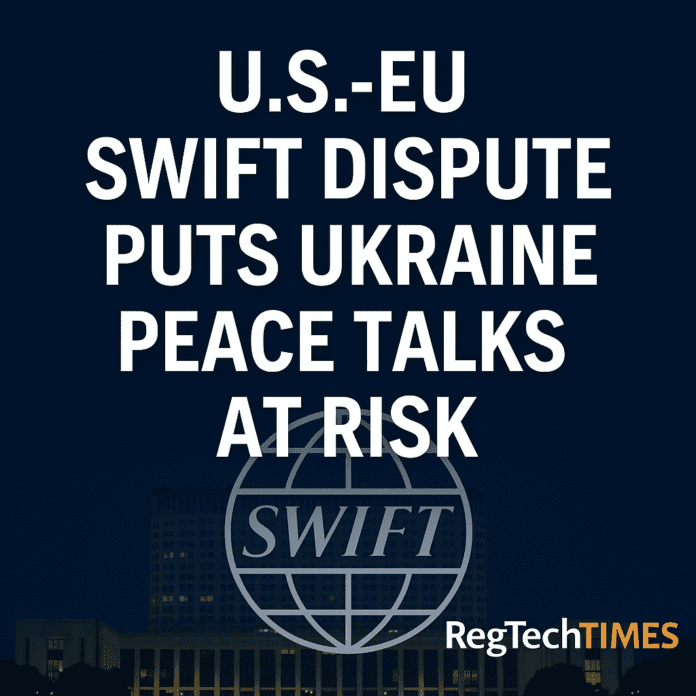For the first time in many years, leaders from Russia and Ukraine are inching closer to sitting down for serious peace talks. These talks are being helped along by the idea of a maritime ceasefire in the Black Sea — a move that could bring back a grain export deal that collapsed in 2022.
But instead of things getting smoother, a disagreement between the United States and Europe over SWIFT, a global payment messaging system, is threatening to stop progress in its tracks.
SWIFT is not money itself but a messaging system that banks use to talk to each other when making international payments. Think of it like the phone lines that connect banks worldwide. If a country or a bank is cut off from SWIFT, it becomes much harder for it to sell or buy things from other countries.
During the early part of the war in Ukraine, the U.S. and Europe worked together to remove several Russian banks from SWIFT. This was meant to hurt Russia’s economy and force it to back off. But now, as part of trying to bring peace, the U.S. is considering allowing one Russian bank to use SWIFT again — only for agricultural exports like wheat and sunflower oil.
China’s Historic Dump of $53 Billion US Treasuries is Unprecedented Blow to US Economy
This move is meant to be a tiny gesture, more symbolic than anything. The goal is to encourage Russia to agree to a maritime ceasefire, which would allow ships carrying food to move safely across the Black Sea. Yet, many European countries and Ukraine see this as giving in to Russia, even if only in a small way.
A Long History of Disagreement
The U.S. and Europe used to be on the same page when it came to punishing Russia with sanctions. But now, that unity is cracking. European leaders are standing firm against any easing of sanctions. They believe that pressure must be kept high on Russia until it pulls back entirely. Meanwhile, the U.S. believes that a minor step, like allowing one bank access to SWIFT for food trade, might help start bigger peace talks.
This small disagreement over SWIFT might seem unimportant, but it has deep roots. Back in 2014, when tensions with Russia first grew, Europe actually blocked earlier U.S. efforts to cut Russia off from SWIFT. At the time, Europe depended heavily on Russian gas and oil. Cutting Russia out completely would have caused an energy crisis in European homes and businesses.
Even when the full war broke out in 2022, the U.S. and Europe still hesitated before using the SWIFT ban. Eventually, they only removed some banks and kept others connected, especially those dealing with oil and gas — showing again that sanctions were never fully airtight.
Critical Shift: China Builds Swift Alternative CIPS Amid Sanctions Fears
Russia, knowing this could happen, had been preparing. For years, it worked to reduce its use of dollars and built trade ties with countries like China and India. This made it harder for sanctions to hurt its economy in a big way. In fact, Russian exports hit a record high in 2022, and by 2024, they returned to normal levels, even without full access to SWIFT.
A Small Move with Big Political Impact
The proposed deal in Saudi Arabia to allow one Russian bank limited access to SWIFT is very narrow. It would only make it easier for countries to pay for Russian food products. It wouldn’t touch Russia’s much bigger oil and gas trade. It also wouldn’t improve Russia’s economy in any serious way.
Still, this small gesture carries a lot of political weight. Russia sees it as a signal that relations with the West might one day return to normal. Ukraine and many European countries see it as a dangerous crack in the wall of sanctions that they worked hard to build.
Inside the U.S., officials seem open to the idea — especially if it helps move peace talks forward. But in Europe, the mood is different. Leaders there are becoming more rigid and unwilling to bend, especially under pressure from Ukraine’s government, which is strongly against any loosening of sanctions.
As tensions rise, Russia is sitting back and watching. It can point to the split between the U.S. and Europe as proof that it is not the one blocking peace. That may give it an edge in the talks, even if only in appearance.
Russia’s Powerful MiG-41 Could Outclass US F-35 Despite Global Sanctions
Meanwhile, the U.S. faces its own political drama. A decision to lift tariffs on European goods was suddenly reversed, and new trade barriers were announced instead. This adds more stress to U.S.-European relations at a moment when unity is needed most.
Now, a technical debate over bank messaging has grown into a major stumbling block. What was meant to be a small compromise to keep talks going is now turning into a full-blown disagreement that threatens to derail everything.


